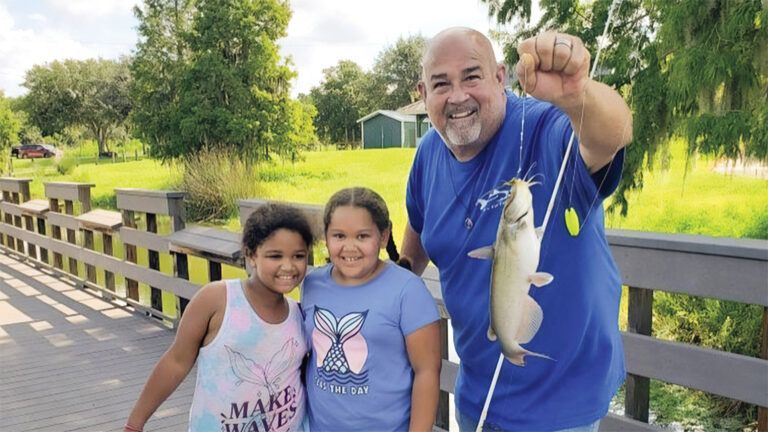When Fred Johnson got out of the Army in 2014, he was looking for something to fill the void left by his days in the service. He didn’t expect it to be performing Shakespeare plays.
Johnson, who helps lead the non-profit professional theater Kentucky Shakespeare’s “Shakespeare with Veterans” program, was enjoying a rendition of the famous playwright’s classic Macbeth in Louisville a few years ago when the idea came to pair soliloquies and scenes with a therapy program for soldiers battling PTSD and other issues.
“There’s no one in the English language that speaks more directly to the warrior’s heart than William Shakespeare,” Johnson tells Guideposts.org, referencing plays like Hamlet. “In any of his texts, any of his plays, monologues, you could find something that resonates with the military experience.”
Johnson connected with Matt Wallace the Producing Artistic Director at Kentucky Shakespeare who’s taken the nonprofit and extended its mission to reach underserved communities. Wallace initiated a program called Shakespeare Behind Bars recently where the group teaches theater to inmates at a maximum security prison in Kentucky. Johnson saw the work the organization was doing and thought there might be a chance to reach veterans as well.
Along with Johnson’s help, the local vet center, and a group for female veterans and service women called Athena’s Sisters, Wallace and Amy Attaway, the organization’s Associate Artistic Director, were able to get Shakespeare with Veterans up and running.
For the past 18 months, 15-25 service men and women from four branches of the military have been meeting weekly to share their stories, rehearse, and put on performances for their neighbors. Attaway says her artistic plans for the group are very simple.
“I bring in a piece of text and we talk about it,” she explains. “We talk about what it means and that usually leads to more stories from them, about their time in the service.”
The group is currently studying Shakespeare’s Julius Caesar, a play that speaks directly to the experience of veterans.
“Julius Caesar is a play that takes place pretty much entirely in wartime,” Attaway explains. “We found a lot of the soldiers’ speeches really resonated with the group. So we decided that it would be worth our time to really dive into that play and how each of the main characters in that play deal with their own conflict on whether to go to war, and how to go to war, and why to go to war, and with whom to go to war.”
When Caesar is killed in the play, Marc Antony rushes to his side and says, “Oh pardon me, thou bleeding piece of earth that I am meek and gentle with these butchers.” He then delivers a famous monologue that concludes with, “Cry havoc, and let slip the dogs of war.”
For Johnson, the text mirrors events that have happened in his own life, serving overseas.
“When I was in Iraq in 2007, I lost a soldier, Sergeant Freeman Gardner,” Johnson says. “He was killed in an IED explosion. We brought him back on base and we actually came around his body, and I remember touching him, kissing his forehead. ‘Pardon me, that bleeding piece of earth, that I am meek and gentle …’ That’s kind of how I felt. I felt powerless. After I got done doing that, I rallied all the people in my particular unit, and we went back on the battlefield.”
Shakespeare has helped Johnson grapple with the guilt of his friend’s death and it’s helped other soldiers relive painful memories and ultimately, heal from them. Part of that is from the words of the prolific playwright, but another part is simply from communing with people who have experienced the same hardships. Attaway begins every session with light-hearted ice breaker games to loosen up the actors and to get the laughs going.
“We spend a lot of time in that two hours laughing at each other, laughing with each other. Partly because of the games, and partly because once we do the silly things, and people see each other doing silly things, people take risks,” Attaway explains. “When people feel brave and supported enough to do that, it means next week they might be ready to tell that story that they’ve been hanging on to for years or decades.”
The program helps veterans connect with each other, but it also hopes to connect civilians with some of the issues facing our service men and women.
“Part of the mission of Shakespeare with Veterans is to not just help the veterans heal, but help civilians better understand veterans,” Attaway says. “When we go out and perform, I feel like I’m sharing this great gift that I get every week by being in a circle with these people. We get to show the civilians for whom we perform; this is who they really are, this is what they’re going through, this is what they’re experiencing.”
Johnson wants the program to serve as a healing tool for veterans, a vehicle to share their stories, and a way to put a face to, as Shakespeare calls them, the real-life “dogs of war.”
“The tagline is ‘Connecting America’s military with American people,’ and this is one way that we provide that connection,” Johnson says. “By experiencing Shakespeare with us and looking through the lens of a veteran, when leaders say, ‘We’re gonna put boots on the ground,’ by being a part of this experience, civilians understand that there are souls in those boots.”





